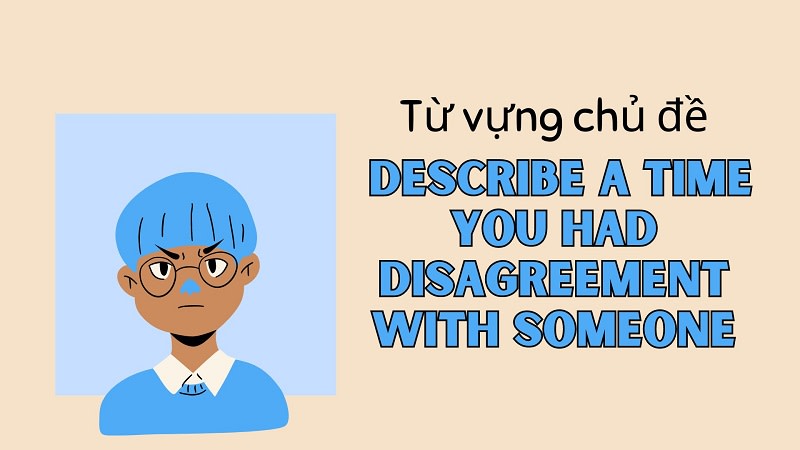This topic often appears in the IELTS Speaking test, especially in Part 2. In this guide, IDP provides you with a detailed outline, useful expressions, and sample answers to help you confidently tackle the topic and impress the examiner.
1. Task Analysis: Describe a Disagreement You Had with Someone – IELTS Speaking
Cue card topic: Describe a time you had a disagreement with someone
You should say:
Who you had the disagreement with
What the disagreement was about
What happened
And explain how you felt about it
2. Sample Answer – Part 2: Describe a Disagreement You Had with Someone
Cue card: Describe a time you had a disagreement with someone
Sample answer:
One disagreement that comes to mind happened a few years ago with a close friend. We were planning a weekend getaway and had agreed on a budget. However, during the trip, my friend started making expensive purchases and booking extra activities without consulting me. I felt like these actions broke the budget we had agreed upon and could cause financial strain for both of us.
At first, I tried to overlook the extra costs, hoping they would not add up. But as the weekend continued, the expenses kept increasing, and I began to feel resentful and frustrated. Eventually, I decided to confront my friend about it and shared my concerns about our financial agreement.
The discussion quickly became heated. Both of us got defensive and exchanged some hurtful words. The disagreement escalated to the point where we did not talk for the rest of the trip.
Looking back, I believe we both could have handled the situation better. We should have discussed our expectations clearly before the trip and communicated more openly throughout the weekend to avoid misunderstandings.
Although our friendship was strained for a while, we eventually talked it out and moved past the issue. This experience taught me how important clear communication and mutual respect are when making any kind of agreement.
High-scoring vocabulary:
Weekend getaway
Consult
Break the budget
Agree upon
Financial strain
Overlook expenses
Resentful
Frustrated
Confront
Heated conversation
Defensive
Hurtful
Escalate
Stick to
Misunderstanding
Talk it out
Agreement or partnership
3. Sample Questions – Part 3: Describe a Disagreement You Had with Someone
Question: How do we stop an argument from escalating into a fight?
To prevent an argument from turning into a physical fight, it's essential to stay calm and avoid reacting with aggression. Showing empathy and actively listening can help de-escalate the situation by making the other person feel heard. It is also important to express your thoughts assertively, not aggressively, and to set boundaries if needed. If tensions continue to rise, stepping away and involving a neutral third party like a mediator or authority figure might be necessary.
Vocabulary:
Physical fight
Aggression
Empathy
De-escalate
Assert one's needs
Disengage
Neutral third party
Mediator
Law enforcement
Question: What disagreements do parents and children usually have?
Parents and children often argue about topics like academic performance, social activities, relationships, or future plans. Disagreements can also stem from personality clashes or communication styles. Still, such conflicts can be valuable learning opportunities, helping both sides to compromise and build stronger relationships.
Vocabulary:
Academic performance
Social activity
Future goal
Communication style
Compromise
Question: How do we show respect to others when we disagree?
We can show respect by listening without interrupting, acknowledging the other person’s perspective, and expressing our views calmly and politely. It’s important to avoid using insulting language, personal attacks, or dismissive remarks. Instead, we should focus on finding common ground or agreeing to disagree when necessary.
Vocabulary:
Interrupt
Acknowledge
Calm and polite manner
Insulting language
Personal attack
Dismissive remark
Common ground
Agree to disagree
4. Vocabulary for the Topic “Describe a Disagreement You Had with Someone”

Word / Phrase | Meaning | Example |
|---|---|---|
Severity | Level of seriousness | His severity scared the children away. |
Non-violence | Peaceful behavior | The Dalai Lama promotes non-violence. |
Confrontational | Aggressive or argumentative | He has a confrontational attitude. |
Counterargument | Opposing viewpoint | She offered a strong counterargument. |
Derogatory language | Offensive speech | He used derogatory language that upset many people. |
Triggers violence | Causes aggression | Offensive language often triggers violence. |
Set an example | Be a role model | Parents should set an example for their kids. |
Respectful behavior | Polite actions | Healthy relationships require respectful behavior. |
Diffusing tense situations | Calming conflicts | Try to diffuse tense situations with understanding. |
Master the Topic “Describe a Disagreement You Had with Someone” with IDP
IELTS Speaking requires preparation and clarity across all topics. By using real experiences and structured responses, you can confidently answer any question, including personal topics like "Describe a disagreement you had with someone."
IDP offers reliable computer-delivered IELTS tests with results available in as little as 2 days. Choose your ideal test date and location through IDP’s flexible IELTS test schedule.
Register for your IELTS test with IDP today and take the next step toward your goals!
